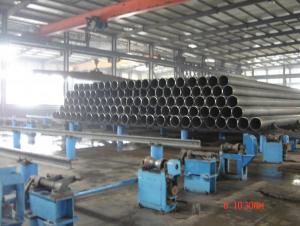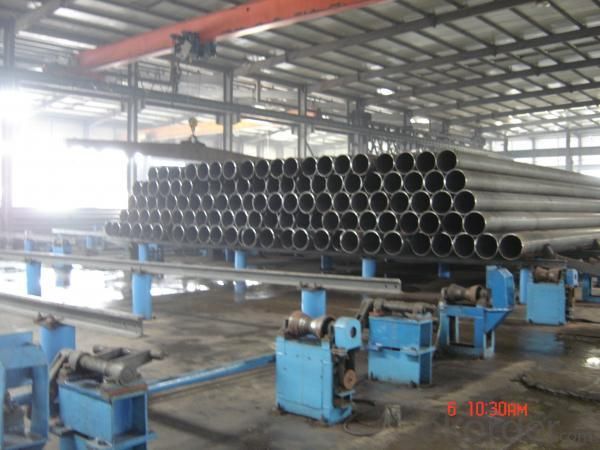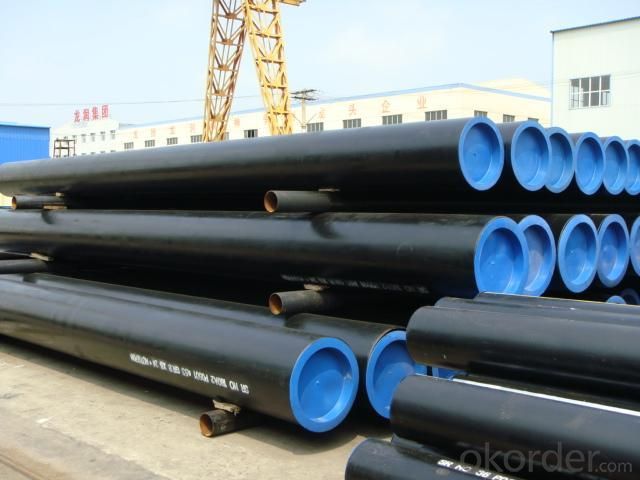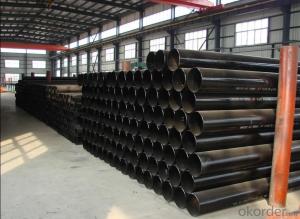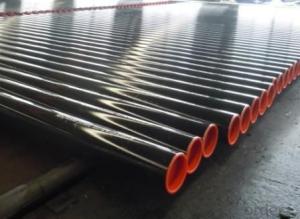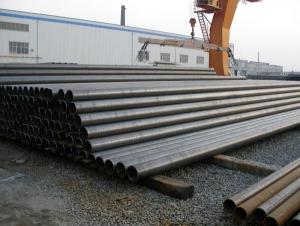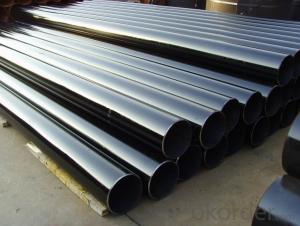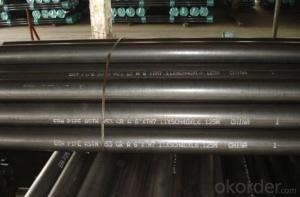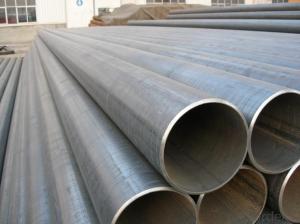API 5L ERW Line Pipes
- Loading Port:
- China Main Port
- Payment Terms:
- TT or L/C
- Min Order Qty:
- 50MT m.t.
- Supply Capability:
- based on order m.t./month
OKorder Service Pledge
OKorder Financial Service
You Might Also Like
API 5L Line Pipes
Application of API 5L Line Pipes:
It is widely applied to line pipe and casing and tubing in oil transportation and casing field, and it is used in Low,high pressure liquid and gassy transportation and it is also good Structure pipe (for furniture, window, door, building , bridge, mechanical etc).
Package of API 5L Line Pipes:
Bundles with anti-rust painting and with plastic caps
Standard of API 5L Line Pipes:
API SPEC 5L, API SPEC 5CT, ASTM A53, GB/T9711.1
Steel Grade of API 5L Line Pipes:
API SPEC 5L: B, X42, X46, X52, X56, X60, X65
API SPEC 5CT: J55, K55, N80, L80-1
ASTM A53: A, B, C
GB/T9711.1:L242、L290、L320、L360、L390、L415、L450
Sizes of API 5L Line pipes:
*Remark: Besides below sizes, we also can arrange production based on requirement of customers
OD | WT | WEIGHT | ||||
INCH | MM | SCH | MM | INCH | KG/M | LB/INCH |
1 1/2” | 48.3 | STD-40 | 3.68 | 0.145 | 4.09 | 2.75 |
1 1/2” | 48.3 | XS-80 | 5.08 | 0.2 | 5.47 | 3.68 |
2” | 60.3 | STD-40 | 3.91 | 0.154 | 5.49 | 3.69 |
2” | 60.3 | XS-80 | 5.54 | 0.218 | 7.56 | 5.08 |
2 1/2” | 73 | STD-40 | 5.16 | 0.203 | 8.72 | 5.86 |
2 1/2” | 73 | XS-80 | 7.01 | 0.276 | 11.52 | 7.74 |
3” | 88.9 | STD-40 | 5.49 | 0.216 | 11.41 | 7.67 |
3” | 88.9 | XS-80 | 7.62 | 0.3 | 15.43 | 10.37 |
3 1/2” | 101.6 | STD-40 | 5.74 | 0.226 | 13.71 | 9.21 |
3 1/2” | 101.6 | XS-80 | 8.08 | 0.318 | 18.83 | 12.65 |
4” | 114.3 | STD-40 | 6.02 | 0.237 | 16.24 | 10.91 |
4” | 114.3 | XS-80 | 8.56 | 0.337 | 22.55 | 15.15 |
5” | 141.3 | STD-40 | 6.55 | 0.258 | 21.99 | 14.78 |
5” | 141.3 | XS-80 | 9.53 | 0.375 | 31.28 | 21.02 |
6” | 168.3 | STD-40 | 7.11 | 0.28 | 28.55 | 19.19 |
6” | 168.3 | XS-80 | 10.97 | 0.432 | 42.99 | 28.89 |
8” | 219.1 | STD-40 | 8.18 | 0.322 | 42.98 | 28.88 |
8” | 219.1 | XS-80 | 12.7 | 0.5 | 65.3 | 43.88 |
10” | 273 | STD-40 | 9.27 | 0.365 | 60.9 | 40.92 |
10” | 273 | 80 | 15.09 | 0.594 | 96.95 | 65.15 |
12” | 323.8 | STD | 9.53 | 0.375 | 74.61 | 50.13 |
12” | 323.8 | 40 | 10.31 | 0.406 | 80.51 | 54.1 |
12” | 323.8 | XS | 12.7 | 0.5 | 98.42 | 66.14 |
12” | 323.8 | 80 | 17.48 | 0.688 | 133.38 | 89.63 |
14” | 355.6 | 40 | 11.13 | 0.438 | 95.51 | 64.18 |
14” | 355.6 | XS | 12.7 | 0.5 | 108.48 | 72.9 |
14” | 355.6 | 80 | 19.05 | 0.75 | 159.71 | 107.32 |
16” | 406.4 | XS-40 | 12.7 | 0.5 | 124.55 | 83.69 |
18” | 457 | STD | 9.53 | 0.375 | 106.23 | 71.38 |
18” | 457 | 40 | 14.27 | 0.562 | 157.38 | 105.75 |
18” | 457 | 80 | 23.83 | 0.938 | 257.13 | 172.78 |
20” | 508 | 40 | 15.09 | 0.594 | 185.28 | 124.5 |
20” | 508 | 80 | 26.19 | 1.031 | 314.33 | 211.22 |
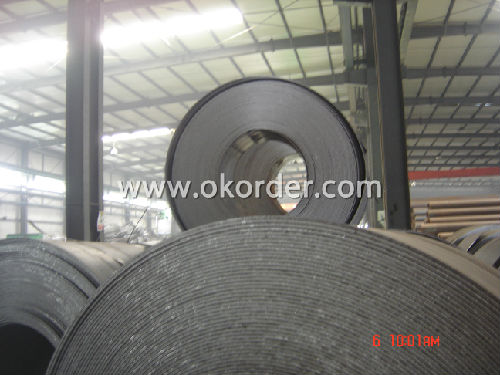
Raw Materials
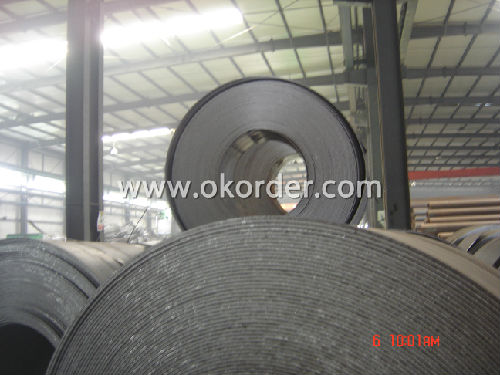
Production Line
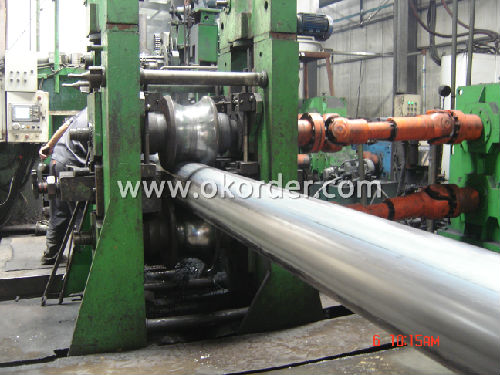
Packing Details
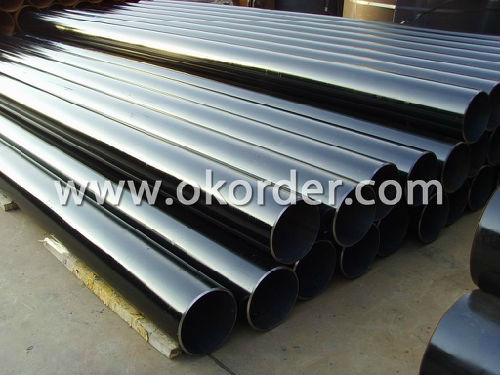
- Q: How are steel pipes graded?
- Steel pipes are graded based on several factors to determine their quality and suitability for specific applications. The grading system for steel pipes typically includes parameters such as the chemical composition, mechanical properties, manufacturing method, and testing standards. 1. Chemical composition: Steel pipes are graded based on the elements present in their composition. This includes the amount of carbon, manganese, phosphorus, sulfur, and other alloying elements. The chemical composition greatly influences the pipe's strength, corrosion resistance, and other properties. 2. Mechanical properties: The mechanical properties of steel pipes are crucial for determining their strength, flexibility, and resistance to pressure and temperature. These properties include tensile strength, yield strength, elongation, hardness, and impact toughness. Pipes with higher mechanical properties are generally graded higher. 3. Manufacturing method: Steel pipes can be manufactured using various methods, such as seamless, welded, or ERW (Electric Resistance Welding). The manufacturing method affects the pipe's integrity, dimensional accuracy, and overall quality. Seamless pipes, for example, are considered to have higher quality due to their uniformity and absence of weld seams. 4. Testing standards: Steel pipes are graded based on their adherence to specific testing standards. These standards ensure that the pipes meet the required quality criteria and are suitable for their intended applications. Common testing standards include ASTM (American Society for Testing and Materials), API (American Petroleum Institute), and EN (European Norms). Based on these factors, steel pipes are often graded using alphanumeric codes or specifications. For instance, pipes used in oil and gas industry may be graded as API 5L (American Petroleum Institute) or pipes used for structural purposes may be graded as ASTM A500 (American Society for Testing and Materials). In conclusion, steel pipes are graded based on their chemical composition, mechanical properties, manufacturing method, and adherence to testing standards. These grades help customers and manufacturers in selecting the appropriate pipes for specific applications, ensuring safety, durability, and efficiency in various industries.
- Q: What materials are used in scaffolding pipes?
- The bamboo scaffold board made of bamboo or bamboo.
- Q: How are steel pipes used in the construction of nuclear power plants?
- Steel pipes are widely used in the construction of nuclear power plants for various critical applications. They are employed in the primary coolant system, where they carry and circulate the pressurized water or liquid metal coolant that transfers heat from the reactor core to the steam generator. Steel pipes are also utilized in the secondary coolant system, which transports the generated steam to drive the turbine for electricity production. Additionally, steel pipes are used for the construction of various auxiliary systems, such as the emergency cooling system or the ventilation system, ensuring the safe and efficient operation of nuclear power plants.
- Q: Can steel pipes be used for scaffolding and support structures?
- Indeed, scaffolding and support structures can make use of steel pipes. Due to their robustness, longevity, and ability to bear substantial loads, steel pipes are commonly employed in the construction industry. They establish a steady and secure framework for scaffolding and support structures, guaranteeing the safety of workers and the stability of the construction undertaking. Moreover, steel pipes possess versatility, enabling convenient assembly and disassembly, rendering them a superb option for temporary structures such as scaffolding. Furthermore, steel pipes exhibit resistance to corrosion, rendering them appropriate for outdoor applications and ensuring the enduring existence of the scaffolding and support structures.
- Q: What's the difference between seamless steel pipe and welded pipe?
- Use, seamless steel pipe is generally used in the condition of higher use, such as temperature and pressure higher, corresponding to the requirements of stress corrosion, seamless steel pipe. With vice.
- Q: What are the different standards for steel pipe manufacturing?
- There are several different standards for steel pipe manufacturing, including ASTM (American Society for Testing and Materials), ASME (American Society of Mechanical Engineers), API (American Petroleum Institute), and DIN (Deutsches Institut für Normung). These standards provide specifications for various aspects of steel pipe production, such as dimensions, chemical composition, mechanical properties, and testing procedures. Compliance with these standards ensures the quality and reliability of steel pipes for different applications and industries.
- Q: How are steel pipes inspected for quality?
- Steel pipes are inspected for quality through various methods such as visual inspection, non-destructive testing techniques like ultrasonic testing, magnetic particle inspection, and radiographic testing. These inspections help identify any defects, cracks, or imperfections in the pipes, ensuring they meet the required quality standards. Additionally, mechanical tests such as tensile strength and hardness tests may also be conducted to assess the structural integrity of the steel pipes.
- Q: Are steel pipes suitable for high-pressure applications?
- Indeed, steel pipes prove to be an appropriate choice when it comes to high-pressure applications. Renowned for their robustness and endurance, steel pipes are exceptionally well-suited for managing high-pressure scenarios. They possess the remarkable ability to endure the intense internal pressure exerted by fluids or gases without buckling or rupturing. Thanks to their high tensile strength, steel pipes effectively combat the forces that arise in high-pressure environments, thereby ensuring the security and dependability of the piping system. Furthermore, steel pipes can be manufactured with thicker walls, further bolstering their capacity to withstand elevated pressures. Consequently, steel pipes find extensive utilization in various industries, such as oil and gas, petrochemical, power generation, and water distribution, where high-pressure applications are customary.
- Q: Fastener type steel pipe scaffold steel pipe wall thickness
- According to the "construction of fastener type steel pipe scaffold safety technical specifications JGJ130-2011" stipulates that the specification of steel pipe should be Phi 48.3 * 3.6, that is, wall thickness is 3.6mm. The standards in Shanghai are in line with national standards and 3.25mm can be used.Shelf tubes commonly used specifications, sizes are generally 48.3x3.0, 48.3x3.25, 48.3x3.5.
- Q: What are the factors to consider when selecting a steel pipe for a specific application?
- When selecting a steel pipe for a specific application, several factors need to be considered. These include the type of fluid or gas being transported, the pressure and temperature conditions, the size and dimensions required, the desired corrosion resistance, and the overall budget for the project. It is also crucial to assess the pipe's material properties, such as its strength, ductility, and toughness, to ensure it can withstand the operational demands of the application. Additionally, factors like the pipe's manufacturing process, compatibility with joining methods, and any specific industry standards or regulations should be taken into account.
1. Manufacturer Overview
| Location | Tianjin, China |
| Year Established | 2004 |
| Annual Output Value | 250,000Tons |
| Main Markets | Europe; South America; Americas;etc. |
| Company Certifications | API 5L;API 5CT;ISO 9001:2008 GB/T 19001-2008;ISO 9001:2008 |
2. Manufacturer Certificates
| a) Certification Name | |
| Range | |
| Reference | |
| Validity Period |
3. Manufacturer Capability
| a) Trade Capacity | |
| Nearest Port | Tianjin |
| Export Percentage | 50% - 60% |
| No.of Employees in Trade Department | 1000-2000 People |
| Language Spoken: | English; Chinese; Spanish |
| b) Factory Information | |
| Factory Size: | Above 70,000 square meters |
| No. of Production Lines | Above 8 |
| Contract Manufacturing | OEM Service Offered; Design Service Offered |
| Product Price Range | Average |
Send your message to us
API 5L ERW Line Pipes
- Loading Port:
- China Main Port
- Payment Terms:
- TT or L/C
- Min Order Qty:
- 50MT m.t.
- Supply Capability:
- based on order m.t./month
OKorder Service Pledge
OKorder Financial Service
Similar products
Hot products
Hot Searches
Related keywords
